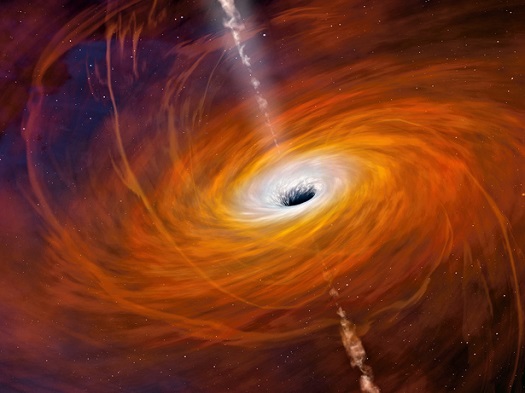
The other day, I was talking online to someone with whom I disagree about everything about the Fermi Paradox. “Talking online” here, as used, is a euphemism for “commenting on each other’s Facebook posts”. The Fermi Paradox wrestles with the consternating observed reality that while the universe mathematically must be simply teeming with intelligent life, we haven’t found any yet. Why is this the case?
Said person pointed me in the direction of the so-called Great Filter, which says that one of the nine steps necessary for widespread intelligent intergalactic contact must be missing. Which seems pretty bogus given that most of the things they think might be missing are things like star-systems with conventionally considered habitable planets (which are everywhere) or cellular life. This last always strikes me as a failure in imagination – just because we are cellular life, why would all life be cellular? We reproduce sexually, but not even all life we observe does that. Why would anything we observe locally be a universal in a universe so big we literally can’t even fathom it?
Regardless, the one that I might buy in the Great Filter is that the universe is unexplorably huge. This is one of two arguments that resolve the Fermi Paradox that I find pretty compelling. And as a believer in an intentionally designed universe, I do think that many (all?) planets are left in deliberate isolation so that they can’t interfere with each other, which also plays into my belief about reincarnation on different planets (never the same one twice), which could conceivably get awkward if the planets were mixing and matching. It’s worth noting that our understanding of the speed of light as an upper limit on travel has never really been breached, despite our desire to hypothesize wildly infeasible solutions to the problem. Which kind of explains how people can believe that just buying a new kind of lightbulb will solve global climate change, not, y’know, the death of capitalism and nothing short of that.
After all, if I were going to design a planet with the intent to convey that it is both part of a vast and larger whole, but that said whole was not to distract them from solving problems at home, what better way than to show them the stars but not let them get very far into them? So that their imagination could conceive that much more and greater than themselves was out there, but that running away was not the way to fix things? If you have a better way of demonstrating that, let me know.
The other solution I’m drawn to, of course, is the so-called Zoo Hypothesis, which states that we are under deliberate quarantine and observation by some individual or confederation of alien life. This actually kind of fits pretty well with the unbridgeable distances idea – we’re not meant to get out and about just yet, until we meet certain standards of decency (that old thorny issue of not beating each other about the head and torso comes to mind). It’s kind of funny that we can envision the Prime Directive as a standard for a hypothetical Star Trek, but be less inclined to think we would be subject to this law as applied by a more advanced star fleet patrolling the galaxy. Of course, they never really honor said Directive in Star Trek and we humans have real trouble imagining anything more advanced than we are being possible (a sick sort of extension of American Exceptionalism, really), so maybe we never really spend a lot of time seriously engaging with the real notion of leaving species alone until they figure things out to a certain level for themselves. It’s important to note that I don’t think this means the people raving about abductions and even crop circles are accurate – quarantine would mean actually quarantined under the auspices of a civilization sufficiently advanced to get here and put that protocol in place. The red-line I envision being somewhere about three solar-system-lengths out – surely observation technology would be sufficiently advanced by that point. Unless we’re the only intelligent species that thinks sophisticated surveillance is an important technological advancement.
But the needly one that everyone seems most drawn to as an answer to the Fermi Paradox is that we all kill ourselves before we can get very far. This was a really popular pick during the Cold War, for obvious reasons, and is resurging in trendiness as we face climate change and terrorism and the relaunch of Full House on television. And it’s one that I don’t find terribly compelling, if for no other reason than our own shortcomings in imagination again (we really think we represent the smartest species when we mostly apply technology to killing each other?). And then there’s the slightly more interesting offshoot of this, that we entertain ourselves into irrelevance – that about the time we can create compelling VR, we’d rather plug ourselves into that than either venture out of the solar system or solve our actually real problems. (Indeed, perhaps the most compelling argument against us being in a VR simulator right now is that so many of us are so unhappy.)
I have recently discovered the most compelling evidence I can for this sad and fatalistic solution to the Paradox. Apparently, some guy, working alone in a lab (literally), has been experimenting with creating artificial black holes. You know, black holes? Those things that are the most terrifying concept you ever heard of before a Clinton supporter described their vision of Donald Trump? The things that literally swallow everything that crosses their path, including light, never to relinquish it again?
It’s almost like the guy was sitting down one day and contemplating how to cause the most harm possible. Large Hadron Collider? Nah, insulates the chain-reaction too well! Genetically engineer fifty Hitlers? Not dangerous enough! Fracking? Destroys things so slowly! I know, we’ll try to recreate the thing that grows infinitely and eats everything, shrouding it in vanished darkness! What could possibly go wrong?
To be fair, it turns out that he’s only tried to create a sonic simulation of black holes, not the light-eating ones that actually patrol the universe. And it’s only a few microns in size. But given that we basically don’t understand where black holes come from or why and only know that they create unfathomable destruction and chaos, maybe we should consider self-restraint just this one single time? Our insatiable curiosity may be why we became intelligent in the first place, but even a cat knows when to say when by comparison to this. My new leading theory is that all those black holes out there were created by super-smart scientists who had no mental filter whatsoever, living in societies like ours so in love with their shiny new science that they killed philosophy off altogether. We’ll just create a small black hole, they said. It’ll be fun, they said.
In the end, hubris is the real killer. It takes enormous strength to decide what we won’t do and stick to it.


